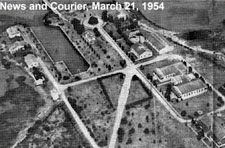College of Charleston and Medical College Propose Joint Use of Fort Johnson Property
Fort Johnson Site Planned As Joint Facility Of College of Charleston And Medical College of S. C.
News and Courier, March 21, 1954
 Use of Fort Johnson on a joint basis by the College of Charleston and the Medical College of South Carolina was proposed here yesterday.
Use of Fort Johnson on a joint basis by the College of Charleston and the Medical College of South Carolina was proposed here yesterday.
Plans were discussed for use of half of the site by the College of Charleston, in co-operation with other Southeastern region schools, and use of the other half by the medical college as an animal research farm.
Announcement was made at a luncheon meeting in the Fort Sumter Hotel that the two Charleston schools have filed joint applications for the site. The applications were made to Mrs. Oveta Culp Hobby, federal secretary for health, education and welfare. As surplus government property, the former quarantine station is now under Mrs. Hobby’s jurisdiction.
Officials of the two local Colleges and representatives of schools interested in establishment of a marine biological research station and marine biological summer school toured the area a 97-acre site on James Island.
Under the program outlined here, the medical college would transfer its present animal colony from quarters a-top a wing of the college to the James Island site. The wooded, and fairly secluded area, would permit enlargement of the colony and a widening of the medical school’s research program Dr. Kenneth M. Lynch, president of the college, stated in his application.
The College of Charleston would establish a system of general and marine biology courses as well as ones in botany and zoology, Dr. George D. Grice, president, said. Dr. Grice acted as chairman at the luncheon, which was sponsored by the College of Charleston and the medical college.
U.S. Sen. Burnet R. Maybank (D-SC) of Charleston said “If they (surplus property officials) approve it in Atlanta, I will look after it in Washington.” Sen. Maybank, a first honor graduate of the College of Charleston, said the program, as outlined, would prove of great value to this area and to the nation at large. “There isn’t enough marine biological research going on now to meet the future needs,” he said.
School representatives here for the luncheon included Dr. Edward McCrady, president and vice chancellor, University of the South (Sewanee); Dr. F. Pendleton Gaines, president of Wofford College; Dr. E. M. Gwathney, president of Converse College; Col. Louis S. LeTellier, Dean of The Citadel; Dr. C. D. Riddle of Furman University; Dr. R. E. Coker and Dr. W. C. George of the University of North Carolina; S. J. McCoy, Dean of Winthrop College; Earle D. Jennings, Dean, and Robert H. Coleman of the College of Charleston; Dr. William E. McCord of the Medical College and others.
Governmental and institutional representatives included Mayor William McG. Morrison of Charleston; G. Robert Lunz of Bears Bluff Laboratories; Charles Ethington of Atlanta, A. K. Haines of Washington and C. R. Gilliam of Columbia, surplus property representatives; Howard J. Sears, Charleston County manager; E. Milby Burton, Charleston Museum director; Edmund P. Grice, Charleston postmaster; W. W. Walker, chairman, Charleston County Council’s public welfare and education committee and Sen. Maybank.
Other colleges which would participate in the marine courses planned by the College of Charleston included the University of South Carolina, Emory University, Clemson College, Hampden-Sydney College, Roanoke College, Southern Missionary College, Tennessee Polytechnic Institute, Virginia Intermont College and Virginia Polytechnic Institute (VPI). Dr. Grice said that no college in South Carolina now offers courses in marine biology.
Dr. Lynch said the medical college expects ultimately to interest a number of foundations in the animal farm project. Harold A. Mouzon, president of the College of Charleston board of trustees, said the move to establish a joint facility was “based on a solid foundation.”
Mayor Morrison promised full support of the city administration in efforts to obtain the site. W. W. Walker, representing Charleston County Council, also pledged support of that group.
Mr. Haines, who is head of Mrs. Hobby’s real estate division, told the group he believed the joint application would be approved. Should it go through, the project would end several years of efforts on the part of various groups to obtain Fort Johnson. The site was last used as a federal quarantine station for the port of Charleston. It was declared surplus in 1949.






